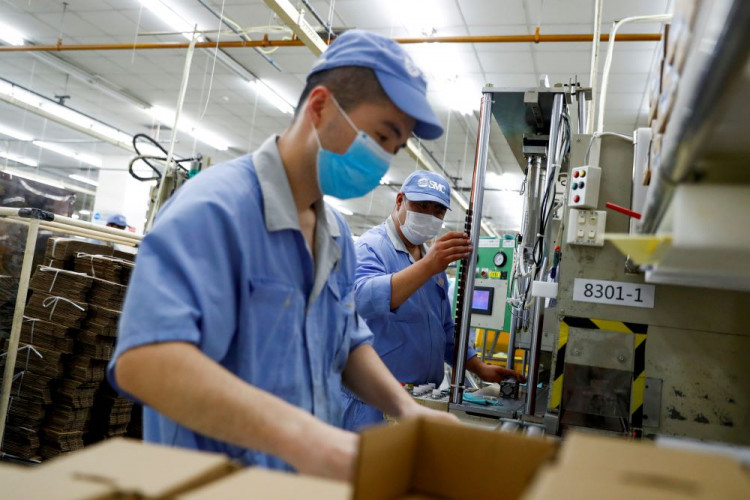China's Caixin general manufacturing purchasing managers' index unexpectedly fell to 50.6 in March from 50.9 in February. It missed market expectations for a rise to 51.3, according to data from Markit Economics Thursday.
The March reading was the lowest since April 2020 and Markit said the surprise fall suggested China's "post-epidemic recovery faltered."
"Both output and new orders grew at softer rates while employment moved closer to stabilization. Meanwhile, the measure for stocks of purchased items remained in negative territory for the third straight month and the measure for quantity of purchases plunged into a contraction," it said.
"The gauge for suppliers' delivery times increased, though it was still in negative territory. On the price front, inflationary pressures intensified with both input costs and output charges rising at steeper rates," Markit said.
However, export sales returned to growth as overseas demand improved as a result of the easing of the virus pandemic thanks to increased vaccinations worldwide.
"Finally, the level of positive sentiment was among the highest seen over the past seven years," Markit said. The survey is compiled by London-based data analytics company IHS Markit Ltd.
The latest reading confirms factory activity in China has been in positive territory for 11 consecutive months. A number above 50 indicates an expansion in activity.
However, the pace slowed for a fourth consecutive month, Caixin said Thursday in a commentary. This indicates the post-epidemic recovery continued to falter, according to a senior economist at Caixin Insight Group Wang Zhe.
"Softening domestic demand was partially offset by demand from overseas, which began growing again in March, with new export orders increasing for the first time this year, according to the survey carried out between March 12 and March 23. This comes as global economic conditions continued to recover from the COVID-19 pandemic," Caixin said.
China's official manufacturing PMI, released by the National Bureau of Statistics Wednesday, rebounded to 51.9 in March from 50.6 the previous month. The official PMI polls a larger proportion of big companies and state-owned enterprises than the Caixin PMI.
"The Caixin manufacturing index published Thursday disappointed - falling to an 11-month low. Taken together (with China's official manufacturing PMI), the surveys are consistent with a slight pickup in momentum but not a return to the rapid rates of month-on-month growth seen last year, Capital Economics' senior China economist Julian Evans-Pritchard said.
"Meanwhile, the pickup in export orders shown on the surveys does little to change our view that the current strength of export growth is unsustainable and will unwind over the coming quarters as vaccinations allow a return to more normal global consumption patterns," he said.
"We doubt that such growth rates can be sustained for long, however. As service sector activity returns to trend, the room for catch-up growth will diminish. And the current strength of exports is likely to unwind over the coming quarters as vaccinations allow a return to more normal global consumption patterns. Finally, less supportive fiscal policy and tighter regulation of real estate developer financing look set to weigh on construction," Capital Economics' senior China economist Julian Evans-Pritchard said.






